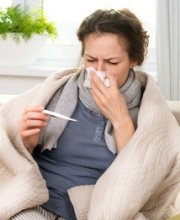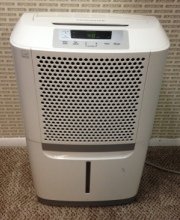Find a Mold Specialist Now
Click or Call, Toll-Free 24/7
Symptoms of Mold Exposure
The symptoms of mold exposure are more varied than you might imagine, although allergic reactions and respiratory problems are the most common. We'll try to answer all your question about mold exposure symptoms, including perhaps the most important one – how do you treat them? While we'll try to give you the information you need, please remember this is not meant to be a substitute for medical care. If you think exposure to mold might be making you ill, please see your doctor.
Symptoms of Mold Exposure
Symptoms of exposure to mold vary widely, depending on numerous factors. While all strains of mold can cause respiratory symptoms and allergic reactions, some strains are more likely to cause illness than others. In general, the more mold in your home, the greater your symptoms will probably be. In addition, the longer you are exposed to mold, the sicker you may become.
While anyone can become sick due to exposure to mold, some people are at greater risk for health problems and for serious complications of mold-related illness than others, including:
- the very young
- the elderly
- pregnant women
- those with pre-existing respiratory problems, such as asthma, emphysema, or chronic obstructive pulmonary disease (COPD)
- those with immune system disorders, such as human immunodeficiency virus (HIV), acquired immune deficiency syndrome (AIDS), or certain autoimmune disorders
- those taking certain medications that suppress the immune system or those undergoing chemotherapy
What Are the Common Symptoms of Mold Exposure?
Symptoms of exposure to mold vary widely and range from minor to severe. In rare cases, life-threatening complications develop as a result of mold in the home. Possible mold exposure symptoms include:

- conjunctivitis (pink eye)
- otitis media (ear infection)
- sinusitis (sinus infection)
- bronchitis
- pneumonia
- itchy, watery, irritated eyes
- sore throat
- coughing
- sneezing
- wheezing
- snoring
- difficulty breathing
- shortness of breath
- asthma attacks or the development of asthma in people not previously diagnosed with the condition
- pulmonary hemorrhage (bleeding in the lungs)
- headaches
- migraines
- fatigue
- rash
- hives
- muscle aches
- joint pain
- skin infections
Are Your Symptoms Caused by Mold?
Unfortunately, that is not always an easy question to answer. Most symptoms of mold exposure can also be caused by other things. For instance, migraines can be caused by exposure to mold but, as the Mayo Clinic points out, they can also be caused by a sensitivity to certain foods or food additives, lack of sleep, hormonal changes, an imbalance in certain brain chemicals, certain medications, and stress. Pneumonia can be caused by mold but it can also be caused by bacteria, viruses or the aspiration of food or other substances into the lungs.
Your doctor will take a thorough history and examine you. Be sure to tell your doctor if you've been exposed to mold or think mold might be causing your symptoms. Depending on the specific symptoms you are experiencing, your doctor may order some tests, such as blood tests, other laboratory tests, a chest x-ray, or allergy tests.
Readers sometimes contact us to describe their symptoms and ask if their condition might be caused by mold. Unfortunately, there is no way for us to know that. We are happy to answer general questions about mold but if you have specific questions or concerns about your health, we encourage you to see your doctor as soon as possible. If you don't have a doctor you see regularly, just make an appointment with a general practitioner or internist (or with a pediatrician, if you're concerned about your child's health). And as always, you are welcome to contact us with general questions or to share your story about coping with mold-related health problems.
Treating the Symptoms of Mold Exposure
The appropriate treatment for you will depend on your specific symptoms, as well as any other health issues you might have. Possible treatments might include:
- antihistamines for allergy symptoms
- corticosteroids (oral or by injection) for allergic reactions or inflammation of the airways
- corticosteroid cream for rash or hives
- eye drops for eye infections
- ear drops for ear infections
- nasal spray for sinus infections
- pain relievers for headaches, muscle pain, or joint pain
- medications to relieve or prevent migraines
- inhalers or breathing treatments to help with asthma attacks or other breathing problems
- antifungal medications
- antibiotics
Most of the time, mold-related health problems can be treated on an outpatient basis. In severe cases, hospitalization may be required.
If your symptoms are severe or don't respond to the initial treatment, or if you have pre-existing health problems, your doctor might refer you to a specialist, such as an allergist, pulmonologist (lung specialist), or infectious disease specialist.
Reducing Mold Exposure
Mold is everywhere in the world around us, indoors and outdoors. It would be impossible to avoid absolutely all exposure to mold. However, it's not the small amounts of mold typically found in our environment that cause the majority of the mold-related symptoms described here. We're talking about exposure to mold in the home, mold that isn't supposed to be there.
If you are experiencing that degree of mold exposure, your symptoms are unlikely to get better and may even continue to get worse, despite medical treatment. In order to reduce your exposure to harmful mold, you'll need to have the mold removed from your home.
While some homeowners prefer to handle the mold removal themselves, the U.S Environmental Protection Agency (EPA) recommends calling in a professional or, at the least, consulting with your physician before beginning mold removal, if you are experiencing mold-related health issues. The process of removing mold exposes you to mold spores that are easily inhaled and can make your symptoms worse.
If you think you might need help with mold removal, you can schedule a free consultation in your home with an experienced professional. Follow this link to find qualified mold removal professionals in your area.
Return From Symptoms Of Mold Exposure To Our Main Mold Health Issues Page
Ref:
EPA - Mold Cleanup
Mayo Clinic - Migraines
Privacy Policy Terms and Conditions Accessibility Do Not Sell My Information Disclaimer Contact Us




